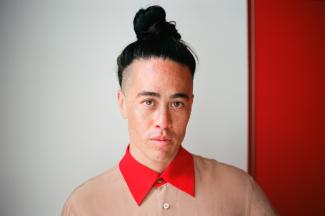
About Fred Moten's poem 'Come on, get it!
Thursday 28 Jan 2021 from 6pm to 6:31pm
A discussion about the translation of the poem 'Come on, get it' with its author Fred Moten, the artist Wu Tsang and the French translators Mawena Yehouessi and Rosanna Puyol.
Through this unprecedented conversation, the artist Wu Tsang looks back at the close collaboration with the author and how the text became the very material of her inspiration and collective practice.
Translators Mawena Yehouessi and Rosanna Puyol discuss the challenges of transposing Moten's language into french.
Fred Moten est un théoricien culturel, poète et universitaire américain dont l'œuvre explore la théorie critique, les black studies, la littérature américaine contemporaine et les études sur les performances. Il est souvent reconnu comme l'un des plus importants poètes américains contemporains.
Au cours des 25 dernières années, Moten a abordé ces préoccupations, par le biais de la poésie et de la critique, dans un certain nombre d'ouvrages : The Universal Machine (consent not to be a single being), Duke University Press, 2018 ; Stolen Life (consent not to be a single being), Duke University Press, 2018 ; Black and Blur (consent not to be a single being), Duke University Press, 2017 ; The Service Porch, Letter Machine Editions, 2016 ; B Jenkins, Duke University Press, 2009 ; In the Break: The Aesthetics of the Black Radical Tradition, University of Minnesota Press, 2003.
Avec Stefano Harney, Moten écrit son ouvrage The Undercommons : Fugitive Planning and Black Study (Minor Compositions, 2013) qui a eu un grand retentissement en Amérique du Nord et nourrit les réflexions accompagnant les luttes sociales comme le mouvement Black Lives Matter.
Fred Moten est aussi un collaborateur de longue date de Wu Tsang : son poème 'Come on, get it' rythme l'oeuvre vidéo monumentale de l'artiste, The Show is Over, (2020).
En 2020, Moten a été nommé "genius fellow" de la Fondation MacArthur.
Tsang re-imagines racialized, gendered representations beyond the visible frame to encompass the multiple and shifting perspectives through which we experience the social realm. Wu Tsang’s work as an artist emerges from collaboration, particularly as a co-organizer of a weekly nightclub called "Wildness", which was a flashpoint for underground art and community activism in Los Angeles.
Taking place at an immigrant gay bar near MacArthur Park in Los Angeles, Wildness created a space where the bar’s longtime patrons, queer people of color, mixed with artists and performers. Tsang’s feature film "Wildness" (2012) documents this scene and the perpetual negotiation of race, gender, and socioeconomic class among the patrons, who wrestle with questions of gentrification, authenticity, and ownership as they encounter each other’s realities. The bar itself plays a leading role in the film, serving as an omniscient narrator and embodying the imaginative and performative acts through which cultural fictions are formed and expressed. The artist became widely known in 2012 thanks to this film, which premiered at MoMA's Documentary Fortnight.
Other films by Tsang include "We hold where study" (2017), "Girl Talk" (2015), "Damelo Todo (Gimme Everything)" (2010), and "Shape of a Right Statement" (2008).
Wu Tsang’s work has been exhibited or screened at Lafayette Anticipations in Paris, Gropius Bau in Berlin, Tate Modern London, Kunsthalle Münster, Stedelijk Museum in Amsterdam, the Whitney Museum of American Art, the Solomon R. Guggenheim Museum in New York, and the Museum of Contemporary Art Chicago, among many other national and international venues.
Wu Tsang received a B.F.A. (2004) from the School of the Art Institute of Chicago and an M.F.A. (2010) from the University of California at Los Angeles.
Mawena Yehouessi est une curatrice, et chercheuse en arts et philosophie (doctorante Villa Arson / Université Côte d’Azur).
Fondatrice du collectif Black(s) to the Future, elle vit et travaille entre Nice et Paris (France). D’une formation aussi de gestion de projets culturels et danse contemporaine, elle appartient à cette génération d’inclassables – ou de déclassé.e.s – dont les pratiques & « métiers » sont une succession de slashs. En particulier intéressée aux alter-futurismes, elle développe en outre une pratique artistique exploratoire, prospective et de collage à travers son avatar M.Y.
Rosanna Puyol est poète, éditrice et collabore avec des artistes pour des projets d’expositions, lectures, programmes de vidéo et performance.
Co-fondatrice de la maison d’édition Brook - avec laquelle elle publie des traductions de textes de Laura Mulvey, Shulamith Firestone, Fred Moten & Stefano Harney, José Esteban Muñoz, Cecilia Pavón, Saidiya Hartman - elle organise, souvent avec des ami*es, des groupes de lecture, ateliers d’écriture et de traduction.
Elle dirige avec Mawena Yehouessi un cours intitulé IRL, sur la traduction et les méthodologies de recherche dissidente, à la Villa Arson à Nice (école des beaux-arts). Ce séminaire a pour but de partager avec les étudiant*es le processus de recherche à l'origine d'une exposition collective que le duo organise à la Villa Arson (l'école est également un centre d'art) en 2022.
Bibliographie
Baldwin, James. Le diable trouve à faire (1976), Capricci, 2018.
Derrida, Jacques, Dissemination (1969), Translated from french by Barbara Johnson, University of Chicago Press, 1983.
Firestone, Shulamith. Zones mortes (1998), Traduit de l'anglais par Emilie Notéris, Brook, 2020.
Frost, Robert. The Poetry of Robert Frost: the collected, Henry Holt & Compagny, 1979.
Harney, Stefano. Moten, Fred. Les sous-communs: planification fugitive et étude noire (2013), Traduction collective, Brook (à paraître), 2021.
Moten, Fred. All That Beauty, Letter Machine Editions, 2019.
Mulvey, Laura. Fétichisme et curiosité (1996), Traduit de l'anglais par Guillaume Mélère, Brook, 2020.
Muñoz, José Esteban. Cruiser l'utopie: l'après et ailleurs de l'avenir queer (2009), Traduit de l'angalis par Alice Wambergue, Brook, (à paraître), 2021.
Zukofsky, Louis. "A", traduit de l’anglais par François Dominique et Serge Gavronsky, Nous, 2020.
Zukofsky, Louis. Catullus, 1969.



